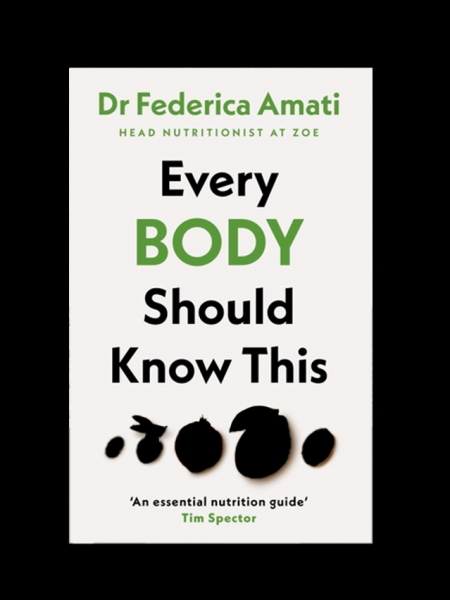
There’s a lot of confusing health information out there. Should you eat breakfast? Or practise intermittent fasting instead? Is it better to work out in the morning or in the evening? And should we really be tracking our blood sugar levels? Different experts often have different opinions, which can make understanding exactly how to live well in the modern age something of a minefield. But help is at hand: in her new book Every Body Should Know This, Dr Federica Amati, head nutritionist at ZOE, explores the science-backed nutrition rules we should know at every stage of life – and they’re less complicated than you might think.

Every Body Should Know This by Dr Federica Amati
£22 £18
Amazon
Not everyone knows it, but our nutrition needs change depending on where we’re at in our lives. Dr Amati’s book aims to bring together the core concepts of life-course nutrition, so that all of us are equipped to expect, understand and accept the natural changes that occur over time, whether that’s when you’re in your twenties or during menopause. “When you have that knowledge, it’s easier to accommodate and work with it, instead of resisting it,” she tells me over the phone.
In fact, the title for the book came from a conversation with one of her clients, who was struggling with her fertility. When Dr Amati shared some simple nutritional rules to follow while trying to conceive, the client admitted it was brand new information. “She said, ‘everybody should know this,’ and that became the title of the book.”
Homeostasis and why it matters
The book is an informative journey through the seasons of life (expect to learn a lot), and one of the fundamental principles of health that Dr Amati explores is homeostasis. “It’s key to understand fundamental biological mechanisms, like homeostasis, because we need to have an understanding of the body’s systems to be healthy,” she explains. “Homeostasis comes from Greek, and basically means ‘staying the same’.”
The “all-powerful” process of homeostasis involves a constant calibration of our systems to keep our health steady, and return things to baseline to ensure we stay alive. We all have different homeostatic points, so the process is different for everyone, but if you’re alive and well, then your body is always maintaining homeostasis. “As an example, we may be exposed to toxins all day, or other things that are harmful, and our body manages to balance them out with homeostasis,” says Dr Amati. “Or, when we’re lying down and then stand up, homeostasis ensures that the right blood vessels constrict, while others get bigger, and our blood pressure and heart rate increase so we don’t pass out on the floor.”
Our biology is super smart, and while there is a whole industry geared towards biohacking for greater health (elements of which do work, others, not so much), the simple fact is that our bodies know best. Subsequently, we can “either work with it and improve our health, spend lots of time and money trying to outsmart it and forget to live, or we ignore it and suffer the consequences,” as Dr Amati writes in the book. I know which one I’d choose.
How to make sure your homeostatic point is healthy
Homeostasis is relative to our own unique set of norms, so how do we make sure that our homeostatic point is healthy? “Our body keeps a measure on what ‘normal’ – or your personal constant – is,” explains Dr Amati. “Which is one of the reasons why it can be difficult for those who suffer with obesity to lose weight – their bodies have adapted to maintain that person’s health and keep them alive based on what’s happening. Their current homeostatic point may be different to the one they had 10 years ago, when they weren’t suffering from obesity.”
Your homeostatic point changes over time, based on what is constant in your life. So if you’re someone who frequently goes running, your body gets used to the impact it has on the body, from your metabolic needs to your appetite. “If you suddenly stopped running, your body would take time to change the systems that are in place to keep you running everyday. That’s a really simple example, but essentially the body adapts and changes to keep us at a steady state, whatever we’re doing, and therefore responds best to a steady input,” says Dr Amati. “It’s the things we do day-in and day-out that impact your homeostatic point.”
Consistency is key
So you can forget fad trends that promise to overhaul your health because – and it’s not a quick fix – the real secret to long-term health lies in making consistently healthy choices. “Consistency is king, it’s not about perfection,” says Dr Amati. “I work with some people who are fit, healthy and have access to great food, but their constant is all over the place because they go to bed at different times each night and travel all over the world. Our bodies are designed to get information from the outside world, check what’s going on inside, and then try to balance the two things.”
Subsequently, maintaining a routine is incredibly good for us – especially within the context of sleep and eating. Sticking to a consistent bedtime and waking up at the same time each day helps to keep our circadian rhythm in check, which is a key part of homeostasis. It’s also a good idea to stick (roughly) to the same eating window every day. “It’s much more helpful for your body to know what to expect, what’s coming, what circadian rhythms are aligning – basically what’s going on,” says Dr Amati. “All of these things factor in.”
If we can move our bodies most days, try and stick to similar bedtimes and morning alarm calls, and eat (a balanced diet) at similar times each day, we will put our bodies and minds in a better position to feel and be well. “The main reason I want people to learn about homeostasis is so they can engage with the fact that their body is very smart,” Dr Amati says. “The body, our biology… we’re a wonder of evolution. It’s time to work with it, rather than against it.”